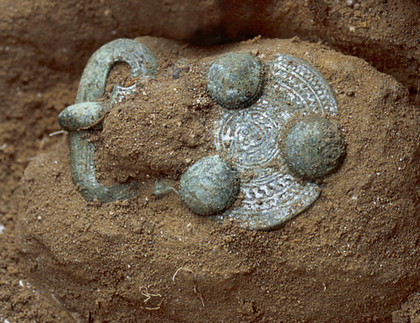Medieval History
A team of French archaeo-anthropologists have discovered two burial sites dating from the Early Middle Ages in Noisy-le-Grand, a suburb of Paris. The discovery was made earlier this year.
The first site, Merovingian (5th-6th centuries) consisting of almost 300 graves, is characterised by plaster sarcophagi, the dead adorned with bead necklaces, ear-rings, brooches and plate buckles (belt). The sarcophagi, orientated east-west, are grouped by family and community.
The second one, Carolingian (8th-10th centuries) is marked by a change in funerary practices, where the bodies are unadorned, wrapped in a shroud and buried directly in the earth. It is believed these changes were due to restrictions by the Catholic church.

Noisy-le-Grand is first mentioned in the History of the Franks, by Gregory of Tours at the end of the 6th century AD, in which he mentions a "royal villa" and an oratory for prayer.
The archaeologists hope to learn much from the remains, including indications about the living conditions of the population of Noisy-le-Grand between the 5th and 10th centuries, their demographic profile, kinship links, and nutritional deficiencies.
Curated by the Regional Archaeological Service (DRAC Île-de-France), this excavation covers 1,200 square meters, in an area that is about to go under construction for a new building complex.
See also these articles from Medievalists.net:
Foreigners in the Histories of Gregory of Tours
The rise of the Carolingians or the decline of the Merovingians?
The Pursuit of Knowledge in Carolingian Europe
- Sixth-century Baptistery Discovered In Kosovo
A historic baptistery structure has been unearthed at one of the most important ancient sites in Kosovo by Turkish archaeologists. It is the first such excavation to be carried out by Turkish archaeologists in Europe. At an excavation site in Kosovo?s...
- Ancient Byzantine Road Unearthed In Greece
Archaeologists have unearthed an ancient marble paved Byzantine road during excavation work for a new metro in the northern Greek port city of Thessaloniki, the Culture Ministry said on Friday. Dating from the third century BC, the marble paved road,...
- Buried In Medieval Graves, They Did Not Rest In Peace
Once laid to rest, the remains of many who died in medieval Europe were not left in peace. As many as 40 percent of graves from the mid-fifth to mid-eighth centuries appear to have been disturbed after burial. Grave robbers, searching for wealth buried...
- Archaeologists Discover Burial Site In Poland
Medieval archaeologists from the Pozna? branch of the Polish Academy of Sciences Archaeology and Ethnology Institutes (IAE PAN) archaeology rescue team and the National Artifact Research and Documentation Center (KOBiDZ) have discovered in Bodzia in central...
- Paris Rediscovers Its First Medieval Fortifications
An excavation on the rue de Rivoli is currently uncovering the first Medieval city fortifications of Paris. This excavation by an Institut national des recherches archaeologiques preventives team has found a deep ditch on land isolated among a group...
Medieval History
Merovingian and Carolingian burial sites discovered near Paris
A team of French archaeo-anthropologists have discovered two burial sites dating from the Early Middle Ages in Noisy-le-Grand, a suburb of Paris. The discovery was made earlier this year.
The first site, Merovingian (5th-6th centuries) consisting of almost 300 graves, is characterised by plaster sarcophagi, the dead adorned with bead necklaces, ear-rings, brooches and plate buckles (belt). The sarcophagi, orientated east-west, are grouped by family and community.
The second one, Carolingian (8th-10th centuries) is marked by a change in funerary practices, where the bodies are unadorned, wrapped in a shroud and buried directly in the earth. It is believed these changes were due to restrictions by the Catholic church.

Noisy-le-Grand is first mentioned in the History of the Franks, by Gregory of Tours at the end of the 6th century AD, in which he mentions a "royal villa" and an oratory for prayer.
The archaeologists hope to learn much from the remains, including indications about the living conditions of the population of Noisy-le-Grand between the 5th and 10th centuries, their demographic profile, kinship links, and nutritional deficiencies.
Curated by the Regional Archaeological Service (DRAC Île-de-France), this excavation covers 1,200 square meters, in an area that is about to go under construction for a new building complex.
See also these articles from Medievalists.net:
Foreigners in the Histories of Gregory of Tours
The rise of the Carolingians or the decline of the Merovingians?
The Pursuit of Knowledge in Carolingian Europe
- Sixth-century Baptistery Discovered In Kosovo
A historic baptistery structure has been unearthed at one of the most important ancient sites in Kosovo by Turkish archaeologists. It is the first such excavation to be carried out by Turkish archaeologists in Europe. At an excavation site in Kosovo?s...
- Ancient Byzantine Road Unearthed In Greece
Archaeologists have unearthed an ancient marble paved Byzantine road during excavation work for a new metro in the northern Greek port city of Thessaloniki, the Culture Ministry said on Friday. Dating from the third century BC, the marble paved road,...
- Buried In Medieval Graves, They Did Not Rest In Peace
Once laid to rest, the remains of many who died in medieval Europe were not left in peace. As many as 40 percent of graves from the mid-fifth to mid-eighth centuries appear to have been disturbed after burial. Grave robbers, searching for wealth buried...
- Archaeologists Discover Burial Site In Poland
Medieval archaeologists from the Pozna? branch of the Polish Academy of Sciences Archaeology and Ethnology Institutes (IAE PAN) archaeology rescue team and the National Artifact Research and Documentation Center (KOBiDZ) have discovered in Bodzia in central...
- Paris Rediscovers Its First Medieval Fortifications
An excavation on the rue de Rivoli is currently uncovering the first Medieval city fortifications of Paris. This excavation by an Institut national des recherches archaeologiques preventives team has found a deep ditch on land isolated among a group...
